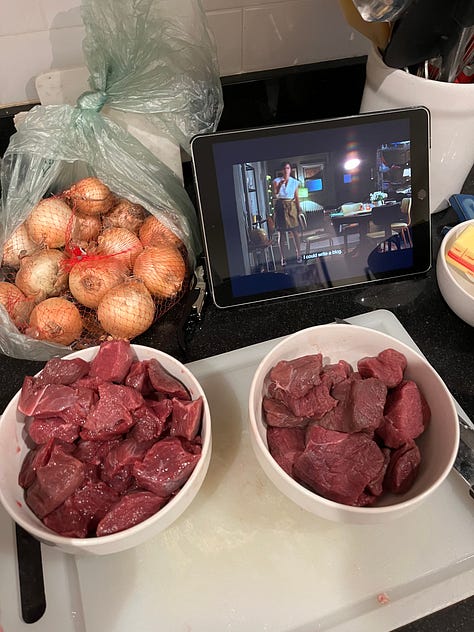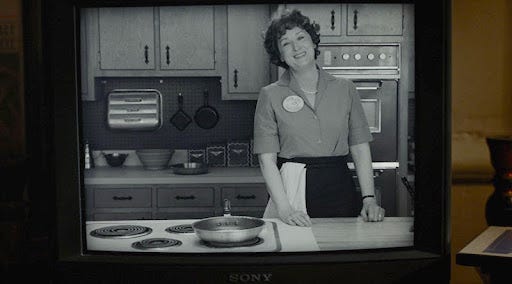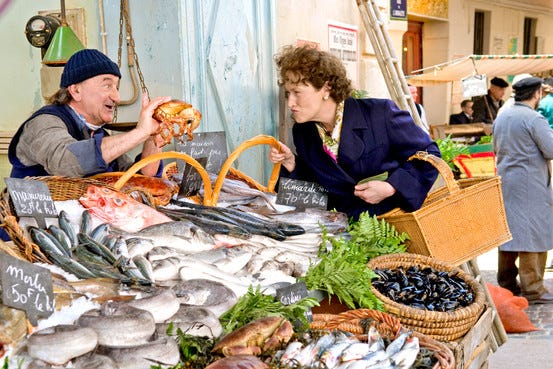If you’re a newer arrival to the Marshall and the Movies, you might not know the full lore behind why Julie & Julia is so core to this project’s existence.
As I once described in a more contemporaneous account on my original site:
You might not be reading this blog if it weren’t from the surge of euphoria and a somewhat bloated ego I had on July 27, 2009. I attended an advanced screening of Julie & Julia, and at promotional screenings, they usually have contests to give away free goods. At this particular one, they were giving away prize packs to people that could do an impression of Julia Child. I was being spurred on by family and friends to go, even though my only knowledge of Julia Child’s voice and mannerisms came from watching Meryl Streep in the trailer.
I ended up getting selected to be one of three people competing for a $30 gift card to Whole Foods Markets and a cooking class. They gave me a whisk and a giant bowl, put a microphone up to my mouth, and told me to be Julia Child for 20 seconds. All I could muster up with confidence was, “I’m Julia Child, don’t be afraid!” From then on, my acting skills kicked in and I improvised for 15 seconds. All the while, I could faintly make out my group cackling with laughter in the dim theater lighting. I ended up getting second place in a voting system decided by applause, mainly because the other woman remembered Child’s most famous line, “Bon appetit!” I still got an apron, a tote bag, some mini kitchen tools, and a $20 gift card though, so it was all good. I rushed back up to my seat with the prizes and became an instant celebrity in my section, asked to reprise my impression multiple times by people I didn’t even know. Perhaps this momentary renown was indirectly responsible for the creation of the blog, but I’ll never be able to sort out the processes of my mind to give you a black and white answer to that.
Later in that film, Amy Adams’ frustrated office drone Julie Powell says in a moment of frustration/revelation: “I can write a blog. I have thoughts.” It’s as if she was speaking directly to me. So I came home and wrote my first blog post, followed by my first movie review: Julie & Julia (available for free with ads on Pluto TV).
The beauty and brutality of the web is that it remembers all, so I have that 15-year-old review available to reference. Below is that review in its entirety. I hope you can observe the original spark that started this all … and some significant growth.
Yum.
According to Julie Powell, that word shouldn’t be used while eating. But as America begins to devour Julie & Julia, I can’t help but think that audiences will use that word. The movie is a delectable treat, serving a luxurious two-course meal: the story of Julia Child (Meryl Streep) before she became the published and televised chef that we know, and Julie Powell (Amy Adams) as she battles the boring world of bureaucracy by baking all 524 recipes in Child’s cookbook.
I do have to give the movie (and Julie Powell, more specifically) a great deal of credit – her blog, “The Julie and Julia Project,” is the inspiration for this blog. At the beginning, Julie is struggling to find some purpose holed up inside her cubicle, forced to drone on and on about the company’s policies. She envies her rich “friends,” who are writing cover stories for top New York newspapers and blogs because they seem to have found merit in their lives. Much like movies are a constant source of comfort to me, Julie found solace in cooking. And one day, she proclaims to her husband, “I can write a blog. I have thoughts.” As I have quickly discovered, it really only takes that little spark of inspiration to start something great (at least in Julie’s case … the verdict is still out on me1).
It is really Julie’s story that captivated me the most. As she works her way through 524 recipes in 365 days (some simple, others quite daunting), anyone who has ever stepped into the kitchen for therapeutic reasons can instantly relate to her struggles and successes. Adams really is the heart and soul of the movie; she brings a pleasant charm to the role, but she also shows a more raw and emotional side than we are used to seeing from her.
Julia’s life in Paris is very amusing, too, much thanks to Meryl Streep’s amazing acting. She completely masters the persona of the larger-than-life personality and woman – but to anyone that has seen Streep’s work, this is hardly a surprise. I fully expect another Oscar nomination for Streep for this role. However, Julia’s story started to become distinctly more dull in the second act of the movie, due in part not to faulty acting, directing, or writing, but rather to Julia Child herself. At the beginning of her time in Paris, her story is more of a fish-out-of-water comedy; after she graduates Le Cordon Bleu academy, her story becomes about a fish in a big pond as she tries to publish her cookbook and impart her secrets to the “servantless” Americans.
Director and screenwriter Nora Ephron (Sleepless in Seattle, You’ve Got Mail) masterfully weaves together these two women’s stories, although I felt that the script begins to lose the connection between the two women as the film concludes. Ephron has for years made movies that are just plain entertaining to watch, and Julie & Julia is no different. The movie is a sweet treat that will be gobbled up by hungry moviegoers for years to come. As Julia Child would say, “Bon Appetit!” A-
At the one-year mark of Marshall and the Movies in 2010, I did a 14-part series called “Marshall & Julie” digging into Powell’s book and looking for other parallels. Such is being 17 years old, I suppose, and thinking that a year constitutes an appropriate amount of distance! (It’s only for the hardcore fans, I fear.) It all culminated with me checking out Child’s Mastering the Art of French Cooking from the Houston Public Library and having my mom help me make the one recipe that seemed doable for a teenager who could barely make grilled cheese.
Julie & Julia is a movie I tend to put on a good amount — especially around this time of the year. But now, 15 years after that fateful screening, I decided to give the film another watch and take a closer look to write about it again.
So below are my updated thoughts on the film, seen through the eyes of someone who now feels the film is a part of their DNA rather than just something they’ve consumed. If you’re just on the free list, this is normally where your access would end. Please consider upgrading to support these posts in the future!
When I first connected with Julie & Julia, cooking was a mere metaphorical abstraction. In the past few years, I’ve started seeing preparing food as more than just an instrumental chore. Cooking and criticism work in equal and opposite directions for me. The former task starts with a series of ingredients that need to be combined into an edible dish, while the latter starts with the finished product and requires deconstruction into its various formal and narrative components. Both take consumption and turn it into creation.
A film is a fixed object. The acting, the cinematography, the editing, and so forth all stay the same once the final cut gets locked. But that doesn’t mean they don’t keep changing. Movies enter another stage of their lives when they encounter an audience. For some, a screenplay can become a prophecy. That’s certainly the case with me watching Julie & Julia, a film that has burrowed itself so deeply into my subconscious that rewatching it gives me the same sensation as looking at an X-ray of my innards.
Where to begin on all I’ve gleaned from Julie & Julia, the twinned tales of culinary icon Julia Child (Meryl Streep) and early blogosphere sensation Julie Powell (Amy Adams)? This film taught me how to turn passion into action — and then to share it with others because it’s just self-serving otherwise. It made me realize that no one is coming to swoop in and give you the life you want. Sometimes, you have to claim it for yourself. But it’s helpful to have a spiritual beacon to give you the green light (but not necessarily direct permission), then serve as a guiding light to step into that authenticity.
Whether I needed to get older or pick up cooking, I’ve come to realize that the point of connection between the two storylines within Julie & Julia are not as discrete as I initially believed. My first review practically treats them as if they are two separate films cross-cut into a feature film with the sole connective tissue being Julie Powell’s parasocial relationship with Julia Child. “It was like […] Julia was there in the room,” Julie waxes poetically about an early childhood memory where her mother made one of Julia’s recipes, “on our side like some great big good fairy, and everything was going to be all right.”
I’m less focused on the point of intersection for the two women now and more intrigued by the parallels. Even Julie Powell’s own book does not yoke her story so directly to Julia Child’s. That synergy derives entirely from the mind of writer/director Nora Ephron, whose screenplay fascinatingly fuses Powell’s Julie & Julia with Child’s autobiography My Life in France.
Ephron was diagnosed with cancer in 2006, a fact she did not share with even some of her closest collaborators; many of them only learned upon her passing in 2012. Looking back now, I find it hard to believe that she didn’t make Julie & Julia knowing it could become her final movie. The film’s structure makes a little more sense when considering it as a vehicle for her to convey a lifetime of accumulated wisdom about life, art, and storytelling. “Above all, be the heroine of your life,” she once told a class of Wellesley graduates in 1996, “not the victim.”
I hadn’t read the commencement speech in its entirety (at least to my recollection) until recently, and it’s striking to see how much Ephron bakes this general disposition on generations of women into Julie & Julia. “Did I say it was hard? Yes,” she continued in that address, “but let me say it again so that none of you can ever say the words, nobody said it was so hard.” Finding the thing that fulfills you is difficult, and a previous cohort figuring it out for themselves does not rid the world of that struggle for the ones coming behind them. But maybe it broadens the possibilities for what that path can be or inspires people to look at themselves differently, and that can be enough.
Julie & Julia is not a baton pass from the former to the latter titular character, especially because Child expressed disapproval of the blog before passing away. It’s about the passage and receiving of wisdom as transmitted through food and translated into cinema. The film’s structure highlights the overlapping lessons between them: the boredom in a new environment, the turn to food as an outlet for meaning-making, the unexpected community they make along the way, and the doubters they have to vanquish (including themselves).
Ephron never overplays her hand by forcing a comparison or insisting on a tidy mirror image between the characters. Julie and Julia share a spiritual connection that grows more potent once it cooks. Like any great recipe fusing two seemingly contradictory flavor profiles, a little heat and time can break down ingredients and rework their chemistry.
“It will be a little messy, but embrace the mess,” Ephron advised in the aforementioned speech. “It will be complicated, but rejoice in the complications. It will not be anything like what you think it will be like, but surprises are good for you. And don't be frightened: you can always change your mind.” Julie & Julia might not be as neat as her screenplays that fit more tidily into a genre mold like When Harry Met Sally, Sleepless in Seattle, or You’ve Got Mail (masterworks all).
But is it any wonder that the one that transformed my life is the one that most resembles life? I love how this film keeps surprising me with new revelations about the interplay between the timelines. Julie & Julia is like the staple recipe you keep coming back to because it’s so satisfying to savor again and again, but you find each time that it’s the changes to your own tastebuds that make it different and delightful.
In a way, maybe it was Ephron all along — and I needed 15 years to understand just how much I was living out a third storyline of Julie & Julia. Julie Powell and Amy Adams were master conduits for what it means to overhaul one’s own life by emulating a successful forebearer, but they aren’t inherently the best inheritors of this spirit of reinvention — just the next ones. I’ve come to realize that the noblest role of all in the Julie & Julia narrative is to set the table for the person who comes after you, and that’s something achievable by simply living in an authentic way worthy of pride.
The film ends with a symbolic meeting of the minds as Julie visits the Smithsonian exhibit featuring Julia’s kitchen. She poses before Julia’s picture, looks it in the eye, and thanks the image’s subject. Then, the spirits of Julia and her husband Paul (Stanley Tucci) re-enter the kitchen and celebrate her accomplishment in publishing a cookbook together. This moment of shared joy unmoored for time itself (as Margaret Whiting sings “Time After Time,” no less) reconciles the impulse for inspiration into a single plane of existence. I’ll never be able to thank Powell or Ephron now that they’ve passed, but I believe I somehow inhabited the same space with them as I rewatched Julie & Julia while making boeuf bourguignon last weekend. That’s the magic of movies.



May your only tears come from onions! Back to you later this week with August’s The Upstream.
Yours in service and cinema,
Marshall
I’ve always had a habit of underestimating myself, clearly.















